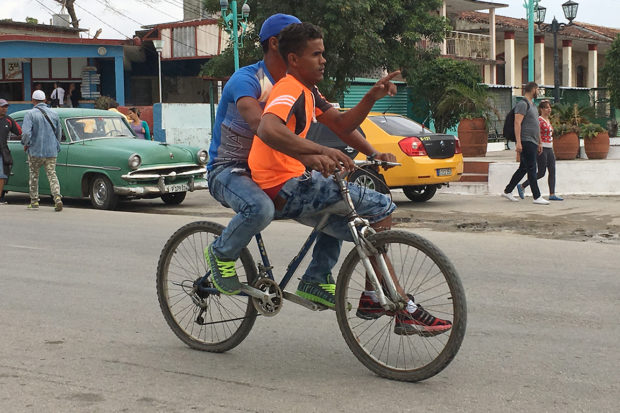
This month, it will not surprise you to learn my column is about Cuba. On July 11, there were demonstrations in Cuba. They were not particularly violent or large demonstrations by U.S. or Latin American standards, and the police response was also moderate by comparison. (Compared to what, you might ask? In Colombia in May, at least 70 demonstrators were killed. Did I miss the U.S. government outrage? Was there any?)
Polarized Politicized News
It is surprisingly hard to get accurate news about these events. The U.S. government obviously has a script and an agenda. More than $20 million a year of our tax dollars (not counting the occult money) goes into destabilization efforts, including false news media and social media.
And, of course, the U.S. blockade of Cuba has been in effect for more than 60 years, along with a travel ban that tries to restrict your going and seeing for yourself.
But in a normal year, I spend roughly 12 weeks a year in Cuba. I know a lot of people there, and I stay in touch. I have a point of view, too: I think we should end the blockade, take care of our own problems and let the Cuban people determine their own future.
What is the U.S. goal here?
The right to peaceful protest—is that what the U.S. government wants? If not, what is it—what’s our real goal? Is this about the Cuban people? The intention of the blockade/embargo is to “bring about hunger and desperation.” That is in the U.S. Government archives.
From a State Department memo: “Salient considerations respecting the life of the present Government of Cuba are: The majority of Cubans support Castro. There is no effective political opposition. The only foreseeable means of alienating internal support is through disenchantment and disaffection based on economic dissatisfaction and hardship…
“Every possible means should be undertaken promptly to weaken the economic life of Cuba…a line of action which, while as adroit and inconspicuous as possible, makes the greatest inroads in denying money and supplies to Cuba, to decrease monetary and real wages, to bring about hunger, desperation and overthrow of government.”
Blockade and Subversion
That’s how it started, and we’re still stuck with it. But the people of Cuba are the ones who are really stuck. We’re just allowing our government to do immoral horrible things to make people suffer and go hungry; they are experiencing them.
Furthermore, we have let our government increase these measures during a worldwide pandemic, cutting off medications, supplies, reagents, raw materials for manufacture of medicines and even remittances—people sending money to their own families in Cuba.
It took a perfect storm—the Trump regime and its apparently unlimited ability to do evil everywhere at once, and an unprecedented pandemic—but some people in Cuba have actually become convinced that their government should do more to fix things—disaffected, in the words of the memo. Not anywhere near a majority, but some.
It’s not surprising, especially since the United States spends millions on media and even agents to tell people in Cuba that they are being abused by their own government rather than by the United States.
My friends are sending me reports (text messages mostly), and they are strongly condemning the demonstrators, which is not surprising, as Cuba is a country with a startlingly low level of public violence. People who overturn cars and assault others are making their compatriots angry. Just as Cuba is much safer than the United States, breaks in the public order are more shocking to people.
But as a U.S. person, I have no trouble imagining people who are struggling to get the food and medicine they need becoming angry and frustrated and lashing out, blindly, without being bad people.
But you might say, the blockade does not include food and medicine. That is not strictly true on paper but certainly the furthest thing from the truth in real life.
What the blockade laws say is that if you wish to trade with Cuba in food or medicine, you can apply to the U.S. government for a license. That will be a difficult, laborious, time-consuming process, and the license might never be granted. Why would a commercial entity bother, unless it has no other market for its product?
Center the Cuban People and Their Opinions
We need to pay attention to the narratives of the Cuban people, to center their opinions, and look at what they want. And we should look first at ourselves.
What role has the United States played in creating a difficult situation in Cuba? What role, if any, should the U.S. government have in aiding the people of Cuba?
Or should we take our blockade and shove it, and allow the Cubans to fix what they want to fix and keep what they want to keep, including dignity and sovereignty? They will do this anyway, regardless of whether we approve. Why not let them go their own way in peace?
Are we really that afraid of losing control in the world if one tiny island nation refuses to bow down?
Why does only Cuba have to be perfect?
Is Cuba really a failed state, as Biden recently said in a bizarre wishful-thinking statement? The short answer is no.
The opponents of the Cuban Revolution are attempting to claim that Cuba needs U.S. humanitarian intervention—we’ve seen just how well that has worked out for other countries. But the statistics say otherwise. Miami-Dade County in Florida has one-fourth the population of Cuba and four times as many Covid-19 deaths.
Cuba has an intact, functioning healthcare system, as well as a vigorous biotech sector and pharmaceutical manufacturing capacity. It has vaccines, but it cannot buy syringes on the world market. Cuba could make its own medications, but it can’t get the raw materials. The reason is the blockade.
Are Cuba, the Cuban Revolution and the Cuban government perfect? No. Why does Cuba need to be perfect to be worthy of normal respect, relations, trade and sovereignty? Is that a demand we make on ourselves and on other countries we have normal relations with?
What should the U.S. government do?
Biden could reverse almost all the Trump increases in the blockade measure—more than 240 of them—with the stroke of a pen, just as they were created. Demand that he do so. Congress needs to act to lift the blockade, and there are bills calling for this in both the Senate and the House: S249, the U.S.-Cuba Trade Act, and HR 3625, the U.S.-Cuba Normalization Act.
Help the Cuban people by letting your senators and representatives know you want them to co-sponsor and support these measures.
Medical Aid to Cuba: Solidarity, Not Charity
There is another action you can take. Global Health Partners, which is a nonprofit that has gone through the weird complexities of the licensing process, will send syringes and, soon, medications and medical supplies to Cuba. To donate, visit https://ghpartners.org/syringes4cuba/.
Checks payable to Global Health Partners (with “Syringe Campaign” in the memo) can be sent to Global Health Partners, 39 Broadway, Suite 1540, New York, NY 10006.
Go See for Yourself When You Can
When the pandemic ends, the best thing to do is to go and find out for yourself. The travel ban included with the sanctions is intended to limit or prevent this, but various groups travel to Cuba legally and some as challenges to the blockade laws, which we feel are immoral.
Check out Global Exchange and Witness for Peace for legal delegations, and Pastors for Peace and Venceremos Brigade for the challenge trips. Or just go. I do. You will be amazed at how much reality differs from the corporate media version. Why do you suppose that is?

